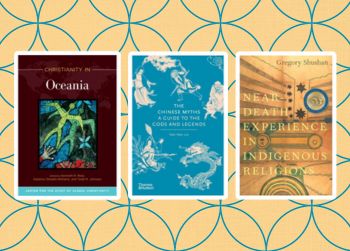Our selections this month offer a fresh take and plenty of food for thought as they tackle topics as varied as Chinese heroes and myths, teachings by ancient Indian women, the role of the Hindu temple in communities, and Tuvalu climate change implications for God-thoughts. It’s easy to reserve your title and have it delivered to your preferred branch for free.
Christianity in Oceania
As the title suggests, this is a survey of Christianity as applied in Oceania. Each chapter addresses individual countries with demographic information and essays by local writers. It charts patterns of growth and decline, explores major traditions, denominations and movements, and looks at current trends as well as themes such as migration, indigenous spirituality, worship or mission. Most treatments either deal with an individual country or take Oceania as a whole but this book’s strength is in its comprehensive collation of Oceanian countries.
Near-death experience in indigenous religions, by Gregory Shushan.
“In this book, Gregory Shushan explores the relationship between [near death experiences], shamanism, and beliefs about the afterlife in traditional indigenous societies in Africa, North America, and Oceania. Drawing on historical accounts of the earliest encounters with explorers, missionaries, and ethnologists, this study addresses questions such as: Do ideas about the afterlife commonly originate in NDEs? What role does culture play in how people experience and interpret NDEs? How can we account for cross-cultural similarities and differences between afterlife beliefs?”–cover.” (Catalogue)
Faithful disobedience : writings on church and state from a Chinese house church movement, by Wang Yi.
Underground movements of any kind develop unique local perspectives, both resilient and fragile. Key writings from the house church have been compiled, and translated for English speakers. Pastor Wang Yi and his church, Early Rain Covenant Church in Chengdu, share their theological stance on the house church and its complicated relationship to the Chinese government. “This unique resource will be valuable to practical and political theologians as well as readers interested in international relations, political philosophy, history, and intercultural studies.”(publisher)
The Hindu temple & its sacred landscape, by Himanshu Prabha Ray.
“The Hindu temple was not merely a place of worship or a static indicator of royal generosity but an institution that involved the active participation of the community for its establishment, maintenance, and survival. Rather than studying temples as isolated structures, Ray suggests that we need to examine them in the context of their social base and the sacred microcosms of which they form a part. … Drawing attention to the vibrancy of the Hindu temple in different locations, The Hindu Temple and Its Sacred Landscape traces the ways in which Hindu notions of sanctity and sacredness were defined and redefined throughout history through the diversity of temple audiences, deities, and rituals.” (Catalogue)
The Chinese myths : a guide to the gods and legends, by Tao Tao Liu
“Tao Tao Liu introduces us to an intriguing cast of gods, goddesses, dragons and monks, including: the ancient hero, Yi the Archer, who shot suns out of the sky to save humanity from a drought; Guanyin, the Goddess of Mercy and Compassion, to whom there are temples dedicated all over East Asia; and Madame White Snake, a water snake spirit in the guise of a mysterious widow, her story adapted into countless films and operas. This book is for anyone interested in China, as knowing its myths allows readers to understand and appreciate its culture in a new light.” (Catalogue)
Vaa fesokotaki : a theology of God for a new Oceanian climate change story, by Tafue Molu Lusama.
“This work argues that the theology of God as te Atua faamasino (divine judge) is problematic because it disconnects te Atua from the suffering of the Tuvaluan people, especially in the light of climate change, and prevents them from understanding in depth the reality of Emmanuel, ‘God with us’. The theological perception of te Atua as the divine judge is non-relational and non-Trinitarian, creating passivity and either fear or a false sense of security in Tuvaluan’s relationship with God. This book examines the theology of God from an Oceanian point of view, using a Tuvaluan relational philosophy called ‘Vaa fesokotaki’ which literally means, the relational sacred space. Vass fesokotaki is used as the hermeneutical lens through which to redefine the theology of te Atua. … Using this indigenous interpretive lens affirms that any reimagining of te Atua must be grounded in the spirtuality of the Oceanian indigenous peoples.” (Catalogue)
The light we give : how Sikh wisdom can transform your life, by Simran Jeet Singh.
“As a boy growing up in South Texas, Simran Jeet Singh and his brothers confronted racism daily. Instead of giving in to negativity, he delved into the Sikh teachings he grew up with and embraced the lessons to seek the good in every person and situation and to find positive ways to direct his energy. Part memoir, part spiritual journey, The Light We Give offers an approach to a happier, more fulfilling life through Sikh teachings on love and service”– Provided by publisher” (Catalogue)
Daughters of the Buddha : teachings by ancient Indian women, by Anālayo
“A testimony to the important contributions made by the women who were direct disciples of the Buddha – and a source of inspiration to Buddhist women today. In this book, esteemed scholar-monk Bhikkhu Anālayo examines accounts of the first female disciples of the Buddha available in the early discourses and their parallels, taking the reader back to the earliest period in the history of Buddhism that can still be accessed today. He dedicates a chapter of his book to each remarkable woman, sharing with the reader her particular insights and teachings.” (publisher)


